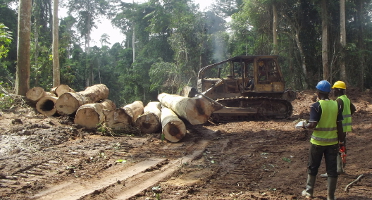
New legislation on conversion of concessions has passed Parliament
Ghana has progressed farthest on the path to FLEGT-licensing among the five African countries implementing a Voluntary Partnership Agreement (VPA) with the EU. In early November, long-awaited new legislation dealing with the conversion of several timber harvesting concessions to Timber Utilisation Contracts (TUCs), among other things, has passed parliament. This means that a number of administrative and technical processes that were stalled due to the absence of this law can now be implemented. Ghana still has some technical and administrative hurdles to overcome before it can start FLEGT-licensing, but the goal is slowly coming within reach.
Main steps that need to be completed before FLEGT-licensing in Ghana can begin include:
- Conversion of timber harvesting concessions to Timber Utilisation Contracts (TUCs). Now that the relevant legislation has passed, the conversion of concessions is to be implemented within a six-month timeframe.
- Updating of VPA Annexes to reflect the new legislation on TUCs. Drafts of the revised Annexes exist, and will now have to be reviewed and approved by the EC.
- Ghana’s Internet infrastructure is being upgraded to ensure flawless functioning of the Ghana Timber Legality Assurance System (GhLAS) and Wood Tracking System (WTS). A short-term solution has already been implemented and is soon to be replaced by a longer-term solution that is being developed with assistance from the UK DFID.
- Finalisation of forest management plans – 32 priority plans that need to be published before the start of FLEGT licensing are scheduled to be completed by end of December 2017. The remaining forest management plans cover less productive forest areas and will be drawn up as funds are made available, which is currently planned for 2018.
- Joint evaluation of the system by the EU and Ghana.
In addition to finalising these activities, respondents of the IMM 2017 company survey in Ghana felt that some capacity building and training would still be required, especially among small companies, to ensure full and consistent compliance with the system. Some also felt there was a need for more technical and operational training on FLEGT-licensing procedures for all parties involved, including the private sector, Forestry Commission staff and customs officials, in order to avoid delays in license issuing.
Ghanaian FLEGT-licensing system not to be based on legality certification
There are some fundamental differences between the already active FLEGT-licensing system in Indonesia and the system Ghana is now implementing. While in Indonesia all companies have to be certified and adhere to standards of the Indonesian national legality assurance system (SVLK), the Ghanaian system is based on online wood tracking, verification of sales contracts and controls of mills’ related inputs and outputs.
The Ghanaian WTS provides for trees to be marked and numbered during an inventory of a demarcated forest area. Once a tree is felled, its number is registered in a Log Measurement Conveyance Certificate (LMCC), which accompanies the log all the way from the forest to the mill. The LMCC is not only available as a paper-based document, but also in the WTS online system and will be checked upon arrival at the mill. There will also be random roadside checks.
If a company wants to sell timber – both internationally and on the domestic market – it will first have to sign a contract with the customer, which lays down details of the purchase, such as product specifications etc. For exports, the company will then have to apply for a FLEGT license (Europe) or Export Permit (other export markets) with the Forestry Commission’s (FC) Timber Industry Development Division (TIDD). The application will have to be accompanied by the sales contract and relevant documentation, including an input/output data sheet, among other things. This documentation will then be checked by the FC and subsequently the license will be issued. For domestic sales, companies need to apply for a Domestic Timber Inspection Certificate (DOTIC); waybills, invoices and receipts for domestic sales will be linked to the DOTIC and thus be able to be traced.
Where exports under FLEGT licenses are concerned, the FC will physically check each container before it is being sealed, to make sure the content matches the license. This procedure will ensure that problems with FLEGT-license mismatches, as they are currently being observed with deliveries from Indonesia, should occur much less frequently. The FC also checks that companies’ timber input and output match and no untracked timber enters the production chain. This is being done for all exports and domestic sales. An online system ensures that data is available at real time.
The FC and an Independent Monitor (IM) will conduct regular audits of the system – both for FLEGT licenses and all other export permits and sales linked to DOTICs – to ensure continuous compliance with VPA provisions.
Shipping of FLEGT-licensed timber from Ghana to three European countries is currently being field-tested.
